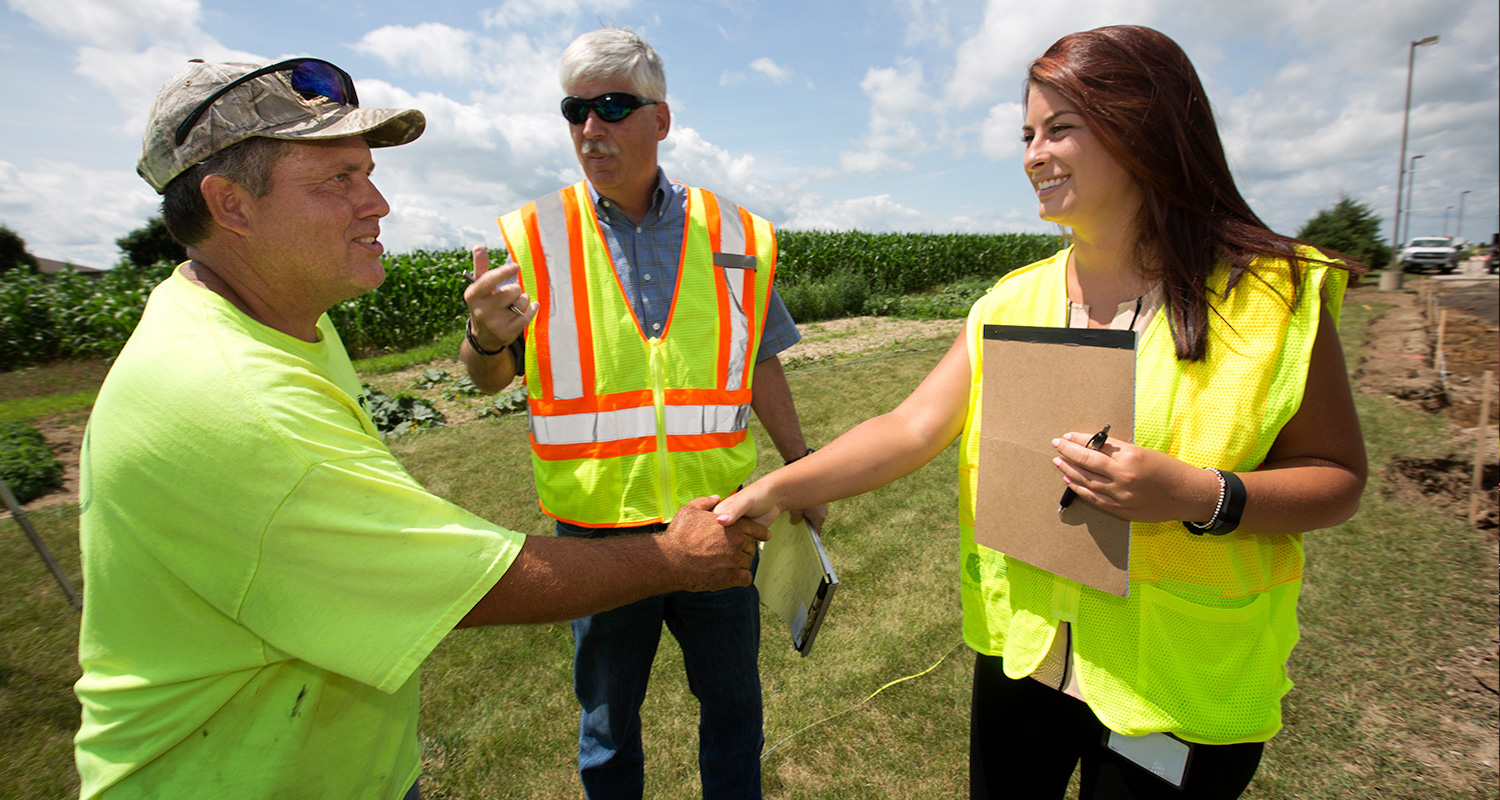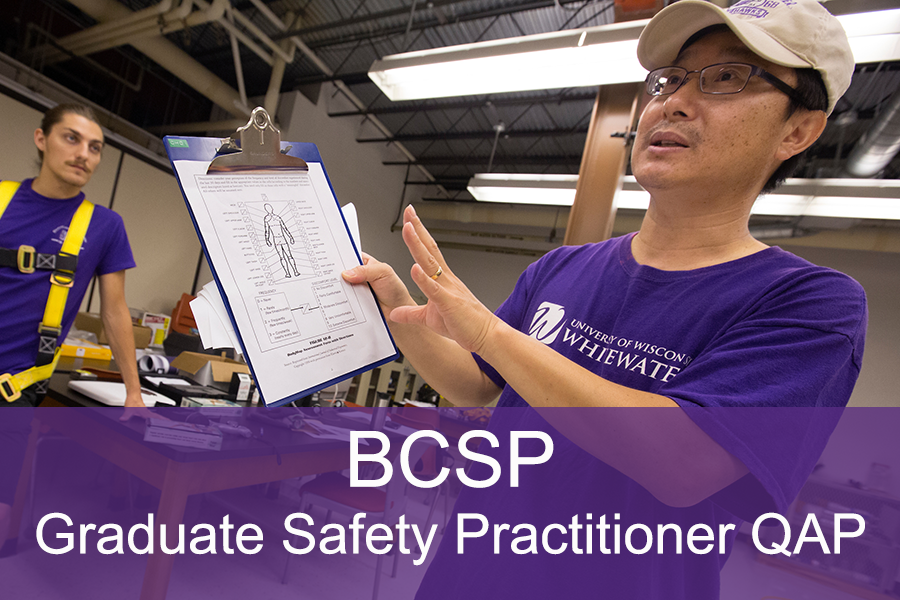MS in Environmental Safety and Health
Graduate Overview
Advance in a high-demand field
There is a growing demand for Environmental Safety and Health (ESH) professionals as businesses and organizations respond to heightened market and societal expectations regarding the consequences of business activities. The Master of Science in Environmental Safety and Health program prepares graduates for advanced roles in either the public or private sector. Above and beyond regulatory compliance, the curriculum examines risk management, environmental stewardship, economic impact, and other critical issues.
Online program designed for working professionals
The MS ESH program is offered 100 percent online and uses an innovative part-time model. Most courses are delivered in sequential 8-week class sessions. Students typically complete their studies in about 2-1/2 years. The program requires a total of 30 or 36 credits of coursework, depending on the program option selected. See Degree Requirements tab for more information.
BCSP-approved curriculum from a respected institution
Our MS ESH has been reviewed by the Board of Certified Safety Professionals and approved as a GSP® Qualified Academic Program. This ensures the curriculum is a substantial match for the Associate Safety Professional® exam blueprint, and graduates can apply to receive the GSP designation. You will learn from full-time, Ph.D. faculty with advanced degrees, industry certifications, and extensive experience in industry, government, and academia. Furthermore, the college's reputation and regional accreditation are acknowledged by employers and other higher education institutions.
Mission to protect
The Department of Occupational and Environmental Safety and Health at the University of Wisconsin-Whitewater is committed to providing a high quality, collaborative and fully online Master of Science in Environmental Safety and Health to working professionals around the world. The goal of the MS ESH program is to deliver an interdisciplinary curriculum that integrates previous and new learning experiences, which enhances the student's intellect, scientific expertise and professional integrity. Our academically and professionally qualified faculty is dedicated to the advancement of the Environmental Safety and Health field, and assisting students to achieve their personal learning goals.
Admission to the Master of Science in Environmental Safety and Health requires:
- A bachelor's degree from a regionally-accredited university or college
- Twenty or more undergraduate credits in science, business, math or engineering
- Completion of at least one semester of college-level probability and statistics
- Completion of at least one semester of college-level chemistry
- The equivalent of at least one year of full-time professional experience in environmental safety and health as documented by work history (i.e., resume) and approved by the College of Business and Economics*
- Computer skills proficiency including the ability to navigate the Internet, manipulate and organize computer files and email, and to use Microsoft Office applications
Exceptions
Exceptions to the admission requirements may be made on a case-by-case basis. Due to competitive enrollments, admission may be limited despite fulfillment of the entrance requirements shown here. Please email or call us at (262) 472-1945 to see if you could be admitted on a conditional basis.
Candidates who do not qualify for admission can consider the Master of Business Administration with Environmental Health and Safety emphasis as an alternative.
*Individuals who do not have the required one year of full-time professional experience in environmental safety and health can be enrolled in the program with prerequisite requirements. These prerequisites can be viewed in the Graduate Catalog under the heading ESH Common Body of Knowledge.
Apply
Apply online today. Review the application process and deadlines.
Overview
The Master of Science in Environmental Health and Safety degree requires 30 or 36 credits of coursework, depending on the program option selected. Most MS ESH courses are delivered in sequential 8-week class sessions. Students completing all courses in a timely fashion should be able to conclude their studies in about two years.
To earn the UW-Whitewater MS ESH, you must:
- Complete the 30-credit research option
- Breadth (24 graduate credits of required courses)
- Elective (3-credit graduate elective)
- Research (3-credit capstone course requiring successful completion of a research paper)*
- OR complete the 36-credit coursework option
- Breadth (24 graduate credits of required courses)
- Electives (12 credits of graduate electives, with at least 6 credits from SAFETY)
- Students must maintain a grade point average of at least 3.0
ESH Breadth Courses (Requirements)
View course information in the Graduate Catalog for more details as well as the most current course list.
- SAFETY 701: Research Methods in ESH (3 credits)
- SAFETY 712: Disaster Planning and Response (3 credits)
- SAFETY 753: Environmental Law (3 credits)
- SAFETY 757: Principles of Occupational Epidemiology (3 credits)
- SAFETY 779: Advanced Topics in Industrial Hygiene (3 credits)
- SAFETY 783: Environmental and Safety Management (3 credits)
- SAFETY 784: Advanced Ergonomics (3 credits)
- SAFETY 787: System Safety Analysis (3 credits)
*Students completing the 30-credit coursework and research option must complete SAFETY 789: Readings and Research in Safety (3 credits).
ESH Electives
View course information in the Graduate Catalog for more details and the most current course list.
- SAFETY 582: Safety in the Construction Industry (3 credits)
- SAFETY 679: Principles and Methods of Industrial Hygiene (5 credits)
- SAFTEY 683: Occupational Safety Management (3 credits)
- SAFETY 685: Fire Protection/Prevention (3 credits)
- SAFETY 687: Product Safety (3 credits)
- SAFETY 710: Healthcare Safety (3 credits)
- SAFETY 737: Ergonomics in Construction (3 credits)
- SAFETY 780: Prevention and Control of Airborne Hazards in the Workplace (3 credits)
MS ESH students pursuing the 36-credit coursework option must complete at least 6 of the 12 credits of electives from SAFETY. Up to six credits may be completed from the Master of Business Administration required or emphasis courses.
Common Body of Knowledge
Individuals who do not have the required one year of full-time professional experience in environmental safety and health can be enrolled in the program with prerequisite requirements. These prerequisites can be viewed in the Graduate Catalog under the heading ESH Common Body of Knowledge.
The Master of Science in Environmental Safety and Health degree program's instructional body is made up of professionals with advanced degrees in engineering and science, and with wide experience in industry, government and academia. All faculty teaching in the MS ESH program hold doctoral degrees. Members of the faculty hold at least one professional certification and many hold multiple ones, including: Certified Safety Professional (CSP), Certified Industrial Hygienist (CIH), Certified Professional Ergonomist (CPE), Professional Engineer (PE), Certified Hazardous Materials Manager (CHMM), Registered Health Specialist/Sanitarian, and Registered Environmental Manager (REM). An overview of key faculty's experience and qualifications is provided below. You may also view a complete list of Occupational Safety and Environmental Health faculty for both bachelor's and master's programs in the College Business and Economics.
 Dr. Ahn has extensive experience in teaching, research, and services in occupational and environmental hygiene and environmental sciences. Before he came to the University of Wisconsin-Whitewater, he taught at the University of Michigan and at Hunter College of The City University of New York. He also worked at the Environment, Health, and Safety Office of the Massachusetts Institute of Technology and at the Department of Environment, Health and Safety of the University of North Carolina - Chapel Hill as an industrial hygienist. His research interests include ventilation applications in laboratory and industry environments, exposure assessment methods and controls for airborne hazards, internationally common urban environmental health & safety issues, and occupational & environmental noise exposure assessment.
Dr. Ahn has extensive experience in teaching, research, and services in occupational and environmental hygiene and environmental sciences. Before he came to the University of Wisconsin-Whitewater, he taught at the University of Michigan and at Hunter College of The City University of New York. He also worked at the Environment, Health, and Safety Office of the Massachusetts Institute of Technology and at the Department of Environment, Health and Safety of the University of North Carolina - Chapel Hill as an industrial hygienist. His research interests include ventilation applications in laboratory and industry environments, exposure assessment methods and controls for airborne hazards, internationally common urban environmental health & safety issues, and occupational & environmental noise exposure assessment.
Education
- Sc.D. Industrial Hygiene, University of Massachusetts Lowell, 2003
- M.S.E.E. Industrial Hygiene, University of North Carolina at Chapel Hill, 1994
- M.S.E. Environmental Engineering, Seoul National University, Seoul, South Korea, 1987
- B.S.E. Urban Engineering, Seoul National University, Seoul, South Korea, 1985
Certifications/Licenses
- Certified Industrial Hygienist (CIH), American Board of Industrial Hygiene
 Tracy Buchman is an Assistant Professor in the Occupational and Environmental Safety and Health Department at UW-Whitewater. She teaches undergraduate and graduate courses in fire protection/prevention, industrial accident prevention and disaster planning. Tracy received her Doctorate in Health Administration (DHA) at the University of Phoenix. She has over twenty-five years of professional practice, research and teaching in the fields of Safety, Security and Emergency Management, and has held several consultant and advisory positions with the Assistant Secretary of Preparedness and Response (ASPR), Department of Homeland Security (DHS), American College of Emergency Physicians (ACEP), Centers for Disease Control and Prevention (CDC), International Association for Healthcare Security and Safety (IAHSS) and National Hospital Incident Command System (HICS). Tracy has made numerous presentations at national and international conferences. She is a member of the American Society of Safety Professionals (ASSP) Healthcare Practice Specialty and the International Association for Healthcare Security and Safety (IAHSS).
Tracy Buchman is an Assistant Professor in the Occupational and Environmental Safety and Health Department at UW-Whitewater. She teaches undergraduate and graduate courses in fire protection/prevention, industrial accident prevention and disaster planning. Tracy received her Doctorate in Health Administration (DHA) at the University of Phoenix. She has over twenty-five years of professional practice, research and teaching in the fields of Safety, Security and Emergency Management, and has held several consultant and advisory positions with the Assistant Secretary of Preparedness and Response (ASPR), Department of Homeland Security (DHS), American College of Emergency Physicians (ACEP), Centers for Disease Control and Prevention (CDC), International Association for Healthcare Security and Safety (IAHSS) and National Hospital Incident Command System (HICS). Tracy has made numerous presentations at national and international conferences. She is a member of the American Society of Safety Professionals (ASSP) Healthcare Practice Specialty and the International Association for Healthcare Security and Safety (IAHSS).
Education
- DHA, 2009, The University of Phoenix
- M.S. Occupational/Industrial Safety Studies, 1994, University of Wisconsin-Whitewater
- B.B.A. Human Resource Management, 1991, University of Wisconsin-Whitewater
Certifications/Licenses
- Master Exercise Practitioner (MEP) (In Progress)
- Homeland Security Exercise and Evaluation Program (HSEEP)
- Certified Healthcare Safety Professional (CHSP)
- Certified Healthcare Protection Administrator (CHPA)
- Certified Hazard Control Manager (CHCM)
- State of WI Fire Inspector I
 Dr. Choi is a nationally and internationally recognized scholar with extensive knowledge and experience in the occupational ergonomics and industrial safety fields. He has produced more than one hundred publications and has been invited multiple times to be as the keynote speaker at prestigious national and international conferences. Dr. Choi is a strong proponent of efforts to integrate research into the ESH practice and is dedicated to bridging the gap between academia and the ESH profession. He is an OSHA-approved outreach instructor for construction and industrial safety. He is a professional member of the American Society of Safety Professionals (ASSP), National Safety Council (NSC), and Human Factors and Ergonomics Society (HFES). Dr. Choi is also serving as the Editor for the American Society of Safety Engineer's Journal of Safety, Health, and Environmental Research.
Dr. Choi is a nationally and internationally recognized scholar with extensive knowledge and experience in the occupational ergonomics and industrial safety fields. He has produced more than one hundred publications and has been invited multiple times to be as the keynote speaker at prestigious national and international conferences. Dr. Choi is a strong proponent of efforts to integrate research into the ESH practice and is dedicated to bridging the gap between academia and the ESH profession. He is an OSHA-approved outreach instructor for construction and industrial safety. He is a professional member of the American Society of Safety Professionals (ASSP), National Safety Council (NSC), and Human Factors and Ergonomics Society (HFES). Dr. Choi is also serving as the Editor for the American Society of Safety Engineer's Journal of Safety, Health, and Environmental Research.
Education
- Ph.D. Industrial Engineering, 2003, Western Michigan University. Major Field: Occupational Ergonomics and Safety
- M.S. Industrial Engineering, 1999, Wichita State University
- B.S. Industrial Engineering, 1996, Kwan-Dong University
Certifications/Licenses
- Board Certified Safety Professional (CSP)
- Board Certified Professional Ergonomist (CPE)
- Authorized OSHA Outreach Instructor for Construction Industry
- Authorized OSHA Outreach Instructor for General Industry
 Dr. Loushine has over 15 years of field experience from Minnesota OSHA, Workplace Safety Consultation, Wisconsin Department of Health and Family Services, UW-Madison, and private consulting/expert witness opportunities. Dr. Loushine is a professional member of the American Society of Safety Professionals (ASSP), and currently participates on the editorial review board for the Professional Safety Journal. His areas of specialty include: Job and work system analysis, workforce perception surveys, identification of critical system and policy incongruencies, integration of safety and quality management, re-engineering for optimal safety, ergonomics, and performance.
Dr. Loushine has over 15 years of field experience from Minnesota OSHA, Workplace Safety Consultation, Wisconsin Department of Health and Family Services, UW-Madison, and private consulting/expert witness opportunities. Dr. Loushine is a professional member of the American Society of Safety Professionals (ASSP), and currently participates on the editorial review board for the Professional Safety Journal. His areas of specialty include: Job and work system analysis, workforce perception surveys, identification of critical system and policy incongruencies, integration of safety and quality management, re-engineering for optimal safety, ergonomics, and performance.
Education
- Ph.D. Industrial Engineering, 2007, University of Wisconsin-Madison
- M.S. Industrial Engineering, 2002, University of Wisconsin-Madison
- B.S. Chemical Engineering, 1994, University of Minnesota
Certifications/Licenses
- Professional Engineer (P.E.), MN License
- Certified Safety Professional (CSP)
- Certified Industrial Hygienist (CIH)
 Dr. Taveira has over twenty years of professional practice in the fields of Human Factors/Ergonomics and Safety as a college professor, researcher, and consultant. His experience includes projects in multiple work environments including agriculture, steel production, mining, railroading, retailing and office settings projects, and in the consumer products area as well. Professor Taveira has over 60 peer-reviewed publications and has made multiple presentations at national and international conferences. His academic experience comprises teaching graduate and undergraduate courses in Human Factors/Ergonomics, Behavioral Aspects of Accident Prevention, Product Safety, and in a number of safety-related courses. He is a member of the American Society of Safety Professionals (ASSP), and of the Human Factors and Ergonomics Society.
Dr. Taveira has over twenty years of professional practice in the fields of Human Factors/Ergonomics and Safety as a college professor, researcher, and consultant. His experience includes projects in multiple work environments including agriculture, steel production, mining, railroading, retailing and office settings projects, and in the consumer products area as well. Professor Taveira has over 60 peer-reviewed publications and has made multiple presentations at national and international conferences. His academic experience comprises teaching graduate and undergraduate courses in Human Factors/Ergonomics, Behavioral Aspects of Accident Prevention, Product Safety, and in a number of safety-related courses. He is a member of the American Society of Safety Professionals (ASSP), and of the Human Factors and Ergonomics Society.
Education
- Ph.D. Industrial Engineering, 1996, University of Wisconsin-Madison
- M.S. Industrial Engineering, 1987, Universidade Federal de Santa Catarina - Brazil
- B.S. Mechanical Engineering, 1984, Universidade Federal de Uberlandia - Brazil
Certifications/Licenses
- Certified Professional Ergonomist (CPE)
- Certified Safety Professional (CSP)
 Dr. Vosburgh is a Registered Environmental Health Specialist/Sanitarian and has worked as a Public Health Sanitarian for non-community public water supplies in Minnesota. She is a member of the American Industrial Hygiene Association (AIHA), Wisconsin American Industrial Hygiene Association, and the National Environmental Health Association.
Dr. Vosburgh is a Registered Environmental Health Specialist/Sanitarian and has worked as a Public Health Sanitarian for non-community public water supplies in Minnesota. She is a member of the American Industrial Hygiene Association (AIHA), Wisconsin American Industrial Hygiene Association, and the National Environmental Health Association.
Education
- Ph.D. Occupational and Environmental Health Industrial Hygiene subtrack, 2010, The University of Iowa
- M.S. Environmental and Public Health, 2002, University of Wisconsin-Eau Claire
- B.S. Applied Ecology and Environmental Sciences, 2000, Michigan Technological University
Certifications/Licenses
- Environmental Health Specialist/Sanitarian, Minnesota (RS628)
Environmental Safety and Health professionals with advanced credentials are in high demand. Based on a 2018 survey by the American Society of Safety Professionals (ASSP) and the Board of Certified Safety Professionals (BCSP),1 the median base salary for full-time professionals is $97,000 and 22 percent of respondents earn $125,000 or more. ESH professionals with a master's degree earn an average of $9,000 more per year than those with a bachelor's degree, and those with an industry-specific licensure/certification such as CSP can earn $20,000 more per year than those without. Information from surveyed UW-Whitewater graduates is shared below, along with the industry-reported salary data.
MS ESH Placement Rate2
100%
Highlighted Employers2
AECOM, Alliant Energy, ConAgra Foods, First in Rescue Safety & Training, Gundersen Health System, M3 Insurance, Oshkosh Corporation, Wisconsin Dept. of Agriculture, Trade and Consumer Protection
Common Titles2
Corporate Safety Officer, EHS Specialist, Liability Claims Specialist, Safety Director, Worker's Compensation Specialist
Industry Salary (national average with median industry tenure of 16 years)1
$97,000
1 BCSP SH&E Industry Salary Survey, 2018
2 Based on 2017 - 2018 survey data




